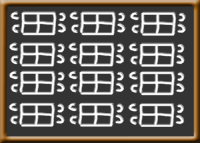By moving four desks together, students can interact with each other but can still easily turn their heads to face the board and teacher.

Brainstorming
Before reading or writing about a particular topic e.g. transport, get the students in their groups to think up all the words and/or ideas they know and write them onto one piece of paper (cars, trains, dangerous drivers, petrol, pollution, I like riding my bicycle etc). This helps to prepare them for the coming activity: they have predicted words they may be reading or come up with ideas and lexis they can use in their writing, and very importantly they are able to see what they already know and teach each other words they have in their personal lexicons. It also allows for some time in the lesson that is relaxed and not teacher-centered.
Discussion
This is also good before students read or write about a topic. It can also be used to recycle language previously encountered by students and may be a nice way to finish a lesson.
Either write a statement on the board or dictate it to the students and give them a time limit (especially if you are worried about noise levels or spending too much time away from the book) to discuss their ideas about the statement.
Students have an opportunity to exchange ideas and practise their English in a relatively unstructured but meaningful way.
Problem solving
Teenagers enjoy the challenge of such activities:
- Dictate the following list: a box of matches, a ball of string, a knife, a radio, enough tinned food for 3 days, aspirins, a hammer and nails, a warm coat, a picture of your family and a gun.
- Explain that in their groups they have been shipwrecked and are on a desert island. There is fresh water on this island, trees and probably dangerous wild animals.
- They must decide together which THREE of the articles on the list they would choose to have with them and be ready to explain why.
This kind of activity makes them think and many teenagers like the challenge. It also encourages exchange of ideas (encourage the use of expressions like ‘What do you think?’) and variety of vocabulary and structures.
Role play
Children of all ages like role plays. They can be used to recycle and consolidate previously learnt language and to practise real life communications in English.
For example, if the class has been studying food vocabulary in their course book, the groups could role play a visit to a local restaurant, with one student being the waiter and the other three a family visiting the restaurant. Students could design the menus before the role play.
For older students it can be valuable for them to role play family situations where there is tension between adults and teens. While in the role of parents or teachers, they are forced to see a situation for the other person’s perspective. They can also have a lot of fun.
Teenagers: Limited resources

Lots of ideas for activities in the classroom that can be done with very limited classroom and school resources.
- 1
- 2
- 3
- Currently reading
Teenagers: Limited resources: Classroom set-up C
- 5
- 6








No comments yet